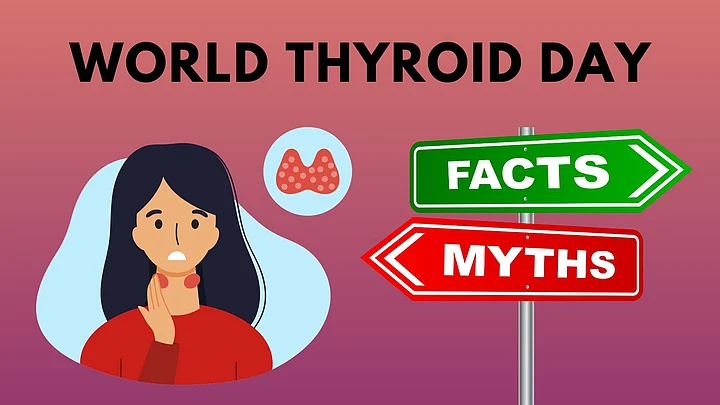Is it true that people suffering from thyroid diseases cannot lose weight? Or that only middle-aged women suffer from the problems?
According to a research published in National Center for Biotechnology Information (NCBI), 420 lakh people in India suffer from thyroid diseases. For World Thyroid Day on 25 May, we reached out to experts to distinguish between the myths and facts about thyroid diseases.
We spoke to Dr Aasim Maldar, endocrinologist and diabetologist, PD Hinduja Hospital, Mahim and Dr Farah Ingale, director-internal medicine, Fortis Hiranandani Hospital, Vashi.
MYTH 1: ONLY MIDDLE-AGED WOMEN SUFFER FROM THYROID DISEASES
According to Centers for Disease Control and Prevention (CDC), thyroid diseases are common among older people however, every age group and gender can suffer from these diseases.
The most common thyroid disorder include hypothyroidism and hyperthyroidism.
According to Maldar, "Even though often these diseases are noticed in middle-aged people but they can range to any age group or any gender."
He also states that hypothyroidism is more commonly seen in women as compared to men. "But it would be wrong to say that men don't suffer with it," he adds.
MYTH 2: PEOPLE SUFFERING WITH THYROID DISEASES CANNOT LOSE WEIGHT
This can be misleading to say that people suffering from thyroid diseases absolutely cannot lose weight.
According to American Thyroid Association (ATA), in hypothyroidism, the body's metabolism becomes slow than the normal rate and as a result people tend to gain some weight which is an excess accumulation of salt and water rather than fat accumulation.
It also adds that in hyperthyroidism, people might experience weight loss and it is related to the severity of the overactive thyroid.
Maldar mentions that people suffering with hypothyroidism tend to retain more water in the body which can lead to weight gain of two to five kg.
However, this can be changed. "Once the hypothyroidism is corrected with a tablet, then there is no reason for them to not lose weight. Of course, they have to work on their diet, do physical exercise, take less stress etc to lose weight but it is not impossible," he adds.
MYTH 3: PROBLEMS RELATED TO THYROID MAKES IT IMPOSSIBLE TO GET PREGNANT
National Institute of Diabetes and Digestive and Kidney Diseases (NIDDK) states that a person with thyroid problems can still have a healthy pregnancy with the help of regular thyroid function tests and thyroid medicines as prescribes by the doctor.
Thyroid hormones are extremely vital for development of the child.
Ingale points out that if thyroid is not under control, then conception may become a little difficult, but it is not impossible.
"It is important that we start treatment of thyroid before people plan pregnancy because thyroid can affect menstrual cycles. If the thyroid is under control then it is easy to conceive," she adds.
Maldar stresses, "Treated hypothyroidism is not an issue with pregnancy. During the pregnancy, medication should be adjusted according to the thyroid reports."
MYTH 4: THYROID SWEELING DEFINITELY MEANS CANCER!
CDC states that thyroid cancers are much less common than benign nodules and with treatment, the cure rate for thyroid cancer can be more than 90 percent.
Maldar mentions that there are another set of diseases which are the structural problems of the thyroid gland and not the functional problem which might result in thyroid swelling.
This swelling has a small chance of the patients having cancer.
"So prevalence of cancer is not directly related to hypothyroidism and it does not mean that the person who has hypothyroidism will definitely develop cancer. Thyroid cancer is not common even though many people might suffer from thyroid nodule or swelling," he adds.
Ingale also stresses on most of the lumps in thyroid are non-cancerous.
A person who has thyroid swelling should undergo sonography and further tests which can identify whether the swelling is cancerous or benign.
MYTH 5: FOR PEOPLE WITH HYPOTHYRODISM, CABBAGE & CAULIFLOWER IS A BIG NO!
Several people fear that eating cruciferous vegetables like cabbage or cauliflower is not safe to consume for people with hypothyroidism.
However, according to experts, there are no particular food items which have to avoided for thyroid health.
"These vegetables have thiocyanate which can interfere with absorption of thyroxine but once they are cooked, this thiocyanate disappear from the vegetables so they become safe to eat," explains Maldar.
A research published by National Institutes of Health (NIH) also states that patients suffering from hypothyroidism can consume only cooked vegetables such as cabbage, brussels sprouts, broccoli, cauliflower, mustard greens, kale, and turnip.
It adds that cooking these vegetables destroys the enzyme responsible for activation of progoitrin to goitrin thus negating its anti-thyroidal potency.
